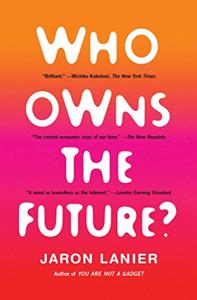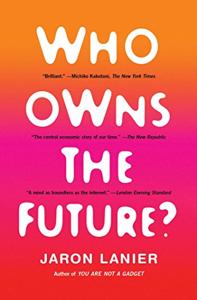
Want to learn the ideas in Who Owns the Future better than ever? Read the world’s #1 book summary of Who Owns the Future by Jaron Lanier here.
Read a brief 1-Page Summary or watch video summaries curated by our expert team. Note: this book guide is not affiliated with or endorsed by the publisher or author, and we always encourage you to purchase and read the full book.
Video Summaries of Who Owns the Future
We’ve scoured the Internet for the very best videos on Who Owns the Future, from high-quality videos summaries to interviews or commentary by Jaron Lanier.
1-Page Summary of Who Owns the Future
Overview
Whenever you browse the web, there are many companies that track your activities. One way to stop them is by using a browser extension like Ghostery to block those spies. The music industry has been through a lot recently; online innovations like Napster and Spotify have completely transformed their working model, and this has led to revenues plummeting in half.
Although many middle class consumers are happy with the fact that music is easily available, there’s a downside. Other industries might be affected in the same way as well, leading to mass unemployment.
The key points in this passage are that the Internet is different from previous technological advances because it creates monopolies, which exploit free contributions.
Robots will be taking care of your grandparents in the future. Soon, you’ll be able to manufacture any product you want from home. You should actually get paid for browsing the internet
Big Idea #1: New technologies are usually beneficial to the economy, but this is not true with technology like the internet.
In the early 19th century, England experienced a lot of changes. The invention of advanced mechanical looms created jobs for many people in factories, but it also took away jobs from those who worked in textile mills.
Some workers were so angry about the machines that they destroyed them. They were called Luddites, after their leader, Ned Ludd.
Eventually, the government cracked down on protesting workers and they found new jobs doing other things. This story illustrates that technological advances cause some problems for people who are laid off (temporarily or permanently). However, in the long run, this creates even more opportunities to create value for the economy.
This pattern has been repeated throughout history, and many people think that it’s happening again. For example, online hotel and flight search engines have greatly reduced the demand for human travel agents. Just as in the pattern described above, the internet has also created new ways to provide value to society by creating content and information for others to read online.
Unfortunately, people who make contributions to technology are not compensated as much as they used to be, which means that our economy is not growing at the same rate it did in the past.
Big Idea #2: Big companies like Google and Facebook give free services and make money by collecting data on users.
Let’s start by looking at how some of the most successful internet companies like Facebook and Google operate. They provide a lot of their services for free, such as Facebook and Google search.
Social media is a great example of this. People can create their own content on Facebook and other social media sites, but they still have to rely on Google for information.
So, how do they make money if the product is free? Mostly through advertising. Google and Facebook display ads to you when you search for something or go on your friends’ pages. The ads are very effective because these companies also keep track of what you’re doing and browsing online: Facebook knows your hobbies, likes and demographics, so it can show you ads based on those interests; Google does the same by drawing from the keywords in your searches. Some companies will even sell that information to third parties for more revenue.
Companies can track you on the Internet. You’ve agreed to that when you sign up for a service like Google or Facebook. When you do, they present an agreement which gives them the right to track your information and potentially re-sell it.






